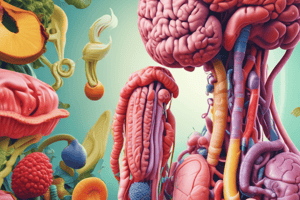Podcast
Questions and Answers
What role does saliva play in the digestive process?
What role does saliva play in the digestive process?
- It acts as a protective barrier in the stomach.
- It aids in the absorption of nutrients in the intestines.
- It breaks down starch into simple sugars. (correct)
- It helps to break down proteins into amino acids.
What is the function of hydrochloric acid in the stomach?
What is the function of hydrochloric acid in the stomach?
- To activate pepsin for protein digestion. (correct)
- To protect the stomach lining from gastric juices.
- To break down starch into simple sugars.
- To neutralize the acidity from the food.
In the experiment with starch and saliva, what indicates the presence of starch?
In the experiment with starch and saliva, what indicates the presence of starch?
- No color change at all.
- A blue-black color change with iodine. (correct)
- A yellow color change.
- A red color when mixed with saliva.
Which part of the digestive system is primarily responsible for nutrient absorption?
Which part of the digestive system is primarily responsible for nutrient absorption?
What protects the stomach from the acidic environment created by digestive juices?
What protects the stomach from the acidic environment created by digestive juices?
Flashcards
Digestion
Digestion
The process of breaking down food into smaller molecules that can be absorbed by the body.
Esophagus
Esophagus
A muscular tube that connects the mouth to the stomach. It helps push food down.
Stomach
Stomach
A strong, muscular organ that churns and mixes food with digestive juices. It breaks down proteins.
Small Intestine
Small Intestine
Signup and view all the flashcards
Salivary Amylase
Salivary Amylase
Signup and view all the flashcards
Study Notes
Digestive System Activity
- The digestive system processes food, breaking down complex molecules into absorbable nutrients
- Food is moved through the digestive tract using muscular contractions called peristalsis
- Saliva contains amylase, an enzyme that breaks down starch into simple sugars
- The stomach secretes hydrochloric acid and pepsin, aiding protein digestion
- The stomach lining is protected by mucus to prevent damage from acid
- The small intestine absorbs nutrients into the bloodstream
- The large intestine absorbs water and prepares waste for elimination
- The digestive system is vital for providing the body with energy and nutrients.
Food Digestion Experiment
- Experiment involving starch solution, saliva, and iodine solution
- Two test tubes (A and B) were used to test the effect of saliva on starch
- Tube A contained saliva and starch
- Tube B contained only starch
- Iodine solution was added to both tubes to observe color change.
- A color change indicates the presence of starch
Digestion Process
- Food is chewed and mixed with saliva in the mouth (buccal cavity)
- Saliva moistens the food and contains an enzyme (amylase) to break down starch into sugar
- Food is passed through the oesophagus to the stomach
- The stomach wall churns, mixes with gastric juices that contain hydrochloric acid and pepsin, a protein-digesting enzyme.
- The acidic environment activates pepsin.
- Mucus protects the stomach wall from acid
- The food then moves to the small intestine, where more enzymes break down food into the absorbable nutrients.
- The large intestine absorbs water from the undigested food and prepares waste for elimination
Studying That Suits You
Use AI to generate personalized quizzes and flashcards to suit your learning preferences.
Description
This quiz focuses on the digestive system's function and the food digestion experiment. It covers the processes of digestion, the role of enzymes, and an experiment demonstrating the effect of saliva on starch. Test your understanding of these essential concepts in nutrition and biological processes.




